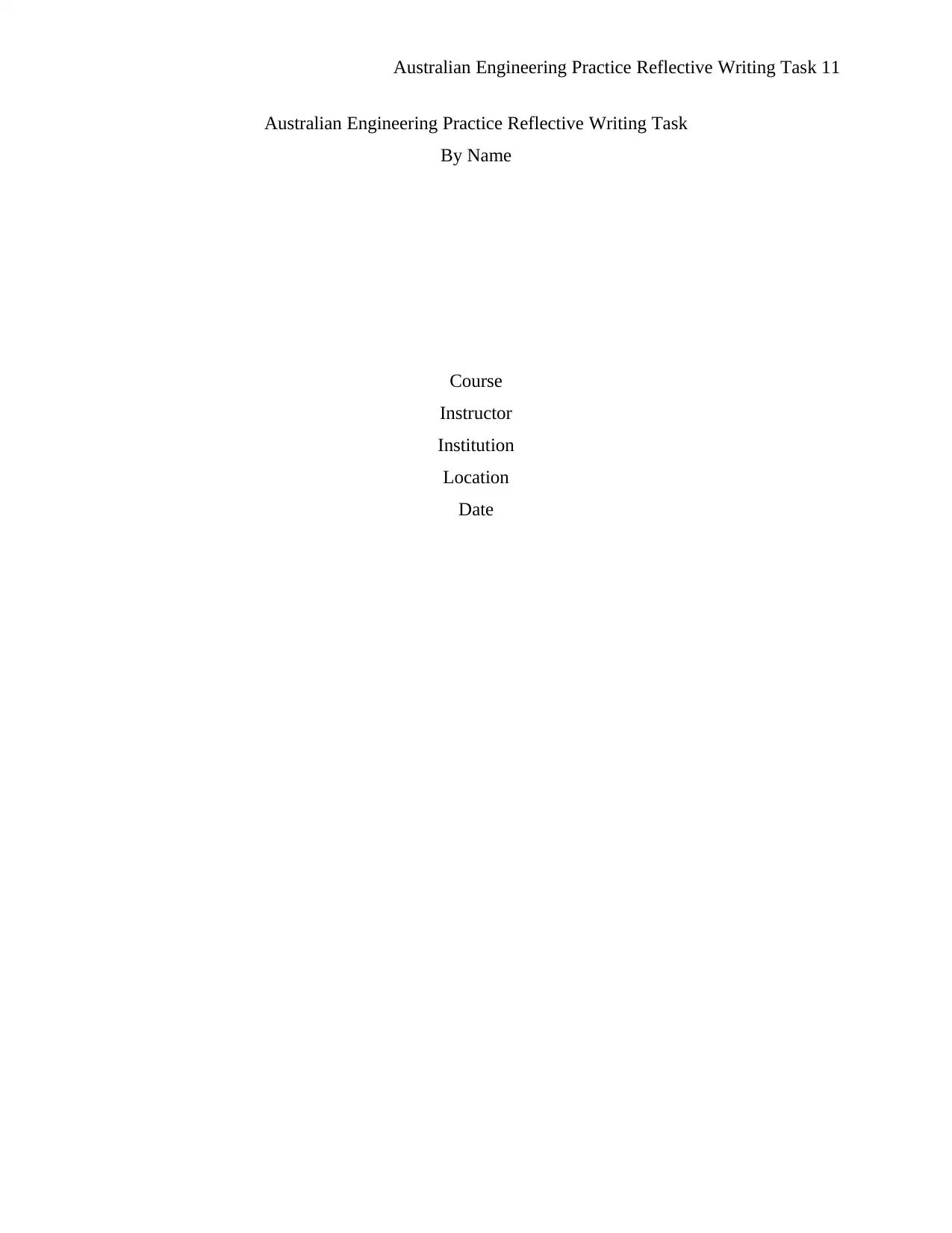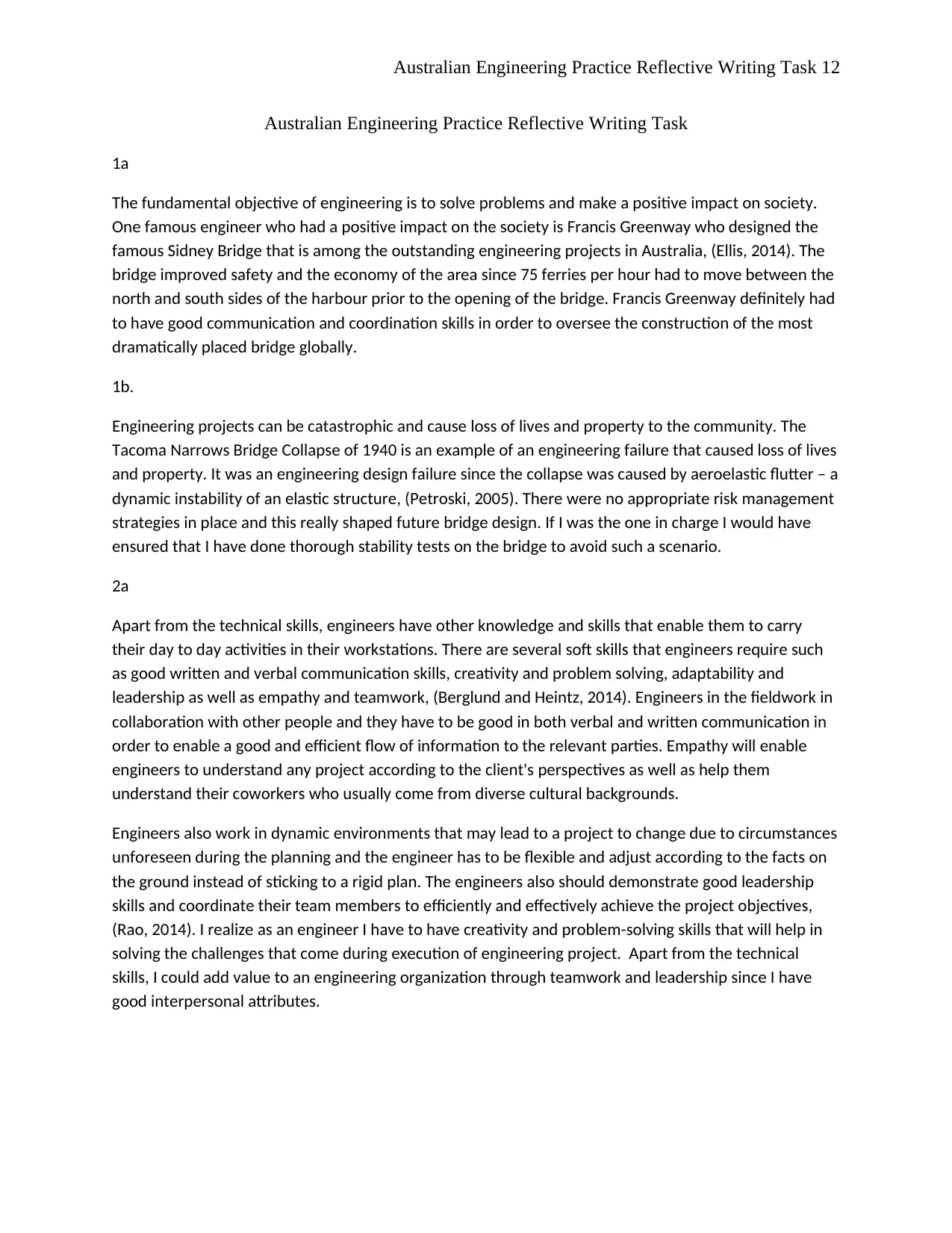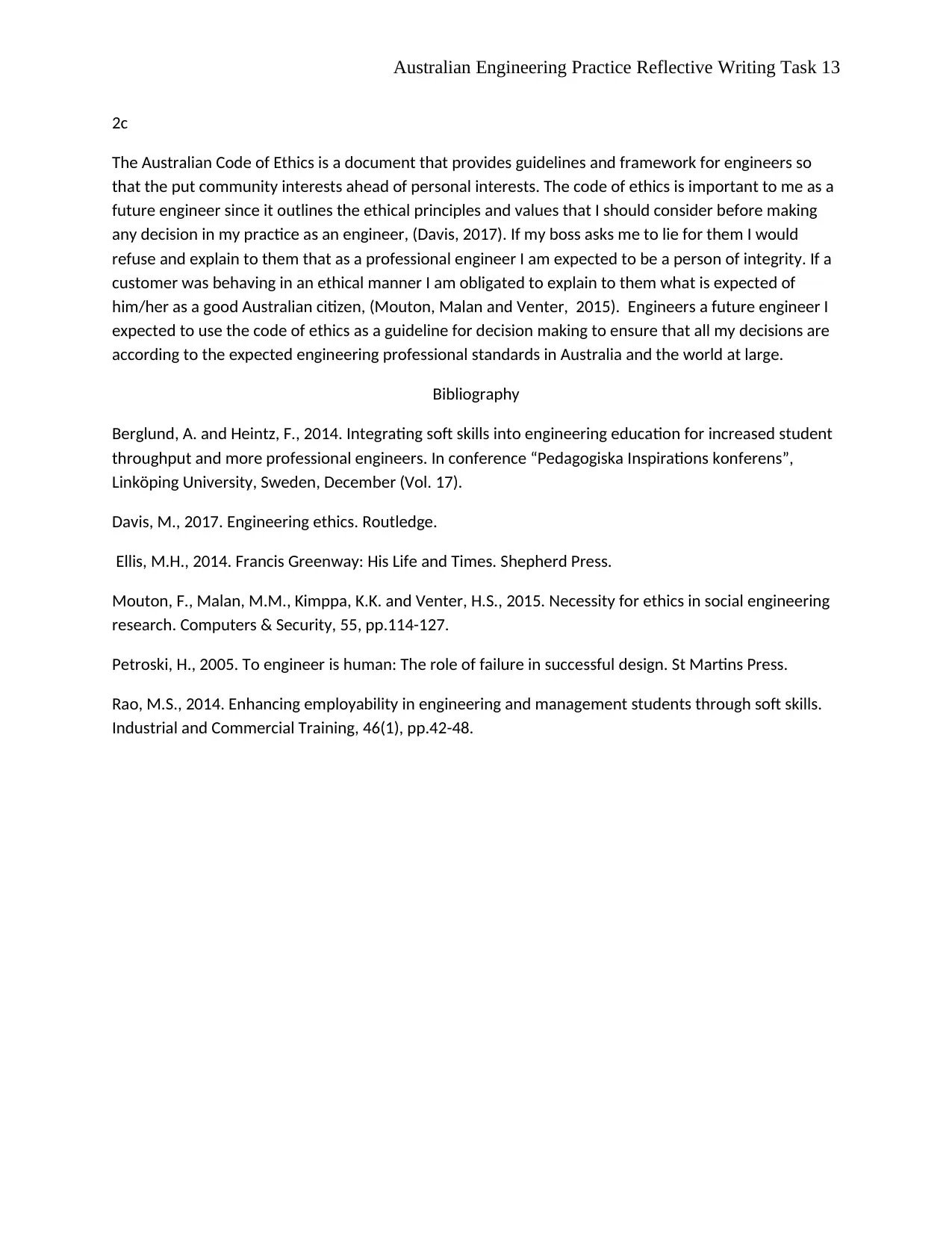ENEG20001 Australian Engineering Practice T3 2018: Reflective Writing
VerifiedAdded on 2023/05/29
|3
|864
|400
Report
AI Summary
This reflective writing task explores various aspects of Australian engineering practice. It begins by examining the positive impact of engineers like Francis Greenway and the Sydney Harbour Bridge, contrasting it with the catastrophic failure of the Tacoma Narrows Bridge. The task emphasizes the importance of soft skills such as communication, empathy, and leadership in addition to technical expertise for engineers. Furthermore, it delves into the Australian Code of Ethics, highlighting its role in guiding ethical decision-making for future engineers. The reflection underscores the need for engineers to prioritize community interests, maintain integrity, and adhere to professional standards. Desklib provides a platform for students to access this document along with a wide array of solved assignments and past papers.

Australian Engineering Practice Reflective Writing Task 11
Australian Engineering Practice Reflective Writing Task
By Name
Course
Instructor
Institution
Location
Date
Australian Engineering Practice Reflective Writing Task
By Name
Course
Instructor
Institution
Location
Date
Paraphrase This Document
Need a fresh take? Get an instant paraphrase of this document with our AI Paraphraser

Australian Engineering Practice Reflective Writing Task 12
Australian Engineering Practice Reflective Writing Task
1a
The fundamental objective of engineering is to solve problems and make a positive impact on society.
One famous engineer who had a positive impact on the society is Francis Greenway who designed the
famous Sidney Bridge that is among the outstanding engineering projects in Australia, (Ellis, 2014). The
bridge improved safety and the economy of the area since 75 ferries per hour had to move between the
north and south sides of the harbour prior to the opening of the bridge. Francis Greenway definitely had
to have good communication and coordination skills in order to oversee the construction of the most
dramatically placed bridge globally.
1b.
Engineering projects can be catastrophic and cause loss of lives and property to the community. The
Tacoma Narrows Bridge Collapse of 1940 is an example of an engineering failure that caused loss of lives
and property. It was an engineering design failure since the collapse was caused by aeroelastic flutter – a
dynamic instability of an elastic structure, (Petroski, 2005). There were no appropriate risk management
strategies in place and this really shaped future bridge design. If I was the one in charge I would have
ensured that I have done thorough stability tests on the bridge to avoid such a scenario.
2a
Apart from the technical skills, engineers have other knowledge and skills that enable them to carry
their day to day activities in their workstations. There are several soft skills that engineers require such
as good written and verbal communication skills, creativity and problem solving, adaptability and
leadership as well as empathy and teamwork, (Berglund and Heintz, 2014). Engineers in the fieldwork in
collaboration with other people and they have to be good in both verbal and written communication in
order to enable a good and efficient flow of information to the relevant parties. Empathy will enable
engineers to understand any project according to the client's perspectives as well as help them
understand their coworkers who usually come from diverse cultural backgrounds.
Engineers also work in dynamic environments that may lead to a project to change due to circumstances
unforeseen during the planning and the engineer has to be flexible and adjust according to the facts on
the ground instead of sticking to a rigid plan. The engineers also should demonstrate good leadership
skills and coordinate their team members to efficiently and effectively achieve the project objectives,
(Rao, 2014). I realize as an engineer I have to have creativity and problem-solving skills that will help in
solving the challenges that come during execution of engineering project. Apart from the technical
skills, I could add value to an engineering organization through teamwork and leadership since I have
good interpersonal attributes.
Australian Engineering Practice Reflective Writing Task
1a
The fundamental objective of engineering is to solve problems and make a positive impact on society.
One famous engineer who had a positive impact on the society is Francis Greenway who designed the
famous Sidney Bridge that is among the outstanding engineering projects in Australia, (Ellis, 2014). The
bridge improved safety and the economy of the area since 75 ferries per hour had to move between the
north and south sides of the harbour prior to the opening of the bridge. Francis Greenway definitely had
to have good communication and coordination skills in order to oversee the construction of the most
dramatically placed bridge globally.
1b.
Engineering projects can be catastrophic and cause loss of lives and property to the community. The
Tacoma Narrows Bridge Collapse of 1940 is an example of an engineering failure that caused loss of lives
and property. It was an engineering design failure since the collapse was caused by aeroelastic flutter – a
dynamic instability of an elastic structure, (Petroski, 2005). There were no appropriate risk management
strategies in place and this really shaped future bridge design. If I was the one in charge I would have
ensured that I have done thorough stability tests on the bridge to avoid such a scenario.
2a
Apart from the technical skills, engineers have other knowledge and skills that enable them to carry
their day to day activities in their workstations. There are several soft skills that engineers require such
as good written and verbal communication skills, creativity and problem solving, adaptability and
leadership as well as empathy and teamwork, (Berglund and Heintz, 2014). Engineers in the fieldwork in
collaboration with other people and they have to be good in both verbal and written communication in
order to enable a good and efficient flow of information to the relevant parties. Empathy will enable
engineers to understand any project according to the client's perspectives as well as help them
understand their coworkers who usually come from diverse cultural backgrounds.
Engineers also work in dynamic environments that may lead to a project to change due to circumstances
unforeseen during the planning and the engineer has to be flexible and adjust according to the facts on
the ground instead of sticking to a rigid plan. The engineers also should demonstrate good leadership
skills and coordinate their team members to efficiently and effectively achieve the project objectives,
(Rao, 2014). I realize as an engineer I have to have creativity and problem-solving skills that will help in
solving the challenges that come during execution of engineering project. Apart from the technical
skills, I could add value to an engineering organization through teamwork and leadership since I have
good interpersonal attributes.

Australian Engineering Practice Reflective Writing Task 13
2c
The Australian Code of Ethics is a document that provides guidelines and framework for engineers so
that the put community interests ahead of personal interests. The code of ethics is important to me as a
future engineer since it outlines the ethical principles and values that I should consider before making
any decision in my practice as an engineer, (Davis, 2017). If my boss asks me to lie for them I would
refuse and explain to them that as a professional engineer I am expected to be a person of integrity. If a
customer was behaving in an ethical manner I am obligated to explain to them what is expected of
him/her as a good Australian citizen, (Mouton, Malan and Venter, 2015). Engineers a future engineer I
expected to use the code of ethics as a guideline for decision making to ensure that all my decisions are
according to the expected engineering professional standards in Australia and the world at large.
Bibliography
Berglund, A. and Heintz, F., 2014. Integrating soft skills into engineering education for increased student
throughput and more professional engineers. In conference “Pedagogiska Inspirations konferens”,
Linköping University, Sweden, December (Vol. 17).
Davis, M., 2017. Engineering ethics. Routledge.
Ellis, M.H., 2014. Francis Greenway: His Life and Times. Shepherd Press.
Mouton, F., Malan, M.M., Kimppa, K.K. and Venter, H.S., 2015. Necessity for ethics in social engineering
research. Computers & Security, 55, pp.114-127.
Petroski, H., 2005. To engineer is human: The role of failure in successful design. St Martins Press.
Rao, M.S., 2014. Enhancing employability in engineering and management students through soft skills.
Industrial and Commercial Training, 46(1), pp.42-48.
2c
The Australian Code of Ethics is a document that provides guidelines and framework for engineers so
that the put community interests ahead of personal interests. The code of ethics is important to me as a
future engineer since it outlines the ethical principles and values that I should consider before making
any decision in my practice as an engineer, (Davis, 2017). If my boss asks me to lie for them I would
refuse and explain to them that as a professional engineer I am expected to be a person of integrity. If a
customer was behaving in an ethical manner I am obligated to explain to them what is expected of
him/her as a good Australian citizen, (Mouton, Malan and Venter, 2015). Engineers a future engineer I
expected to use the code of ethics as a guideline for decision making to ensure that all my decisions are
according to the expected engineering professional standards in Australia and the world at large.
Bibliography
Berglund, A. and Heintz, F., 2014. Integrating soft skills into engineering education for increased student
throughput and more professional engineers. In conference “Pedagogiska Inspirations konferens”,
Linköping University, Sweden, December (Vol. 17).
Davis, M., 2017. Engineering ethics. Routledge.
Ellis, M.H., 2014. Francis Greenway: His Life and Times. Shepherd Press.
Mouton, F., Malan, M.M., Kimppa, K.K. and Venter, H.S., 2015. Necessity for ethics in social engineering
research. Computers & Security, 55, pp.114-127.
Petroski, H., 2005. To engineer is human: The role of failure in successful design. St Martins Press.
Rao, M.S., 2014. Enhancing employability in engineering and management students through soft skills.
Industrial and Commercial Training, 46(1), pp.42-48.
⊘ This is a preview!⊘
Do you want full access?
Subscribe today to unlock all pages.

Trusted by 1+ million students worldwide
1 out of 3
Related Documents
Your All-in-One AI-Powered Toolkit for Academic Success.
+13062052269
info@desklib.com
Available 24*7 on WhatsApp / Email
![[object Object]](/_next/static/media/star-bottom.7253800d.svg)
Unlock your academic potential
Copyright © 2020–2026 A2Z Services. All Rights Reserved. Developed and managed by ZUCOL.





